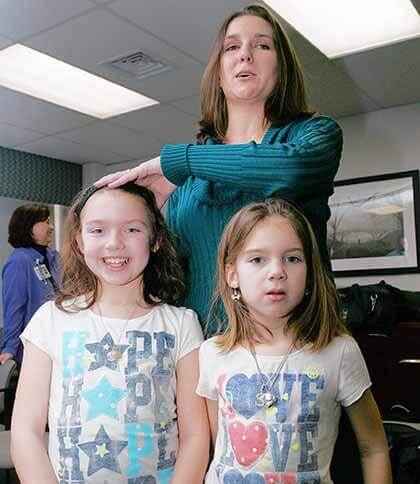By Howard Koplowitz
Teresa Ryan knew her daughter, Taylor, was sick for eight years but did not know why until visiting the Cohen Children’s Medical Center in New Hyde Park.
Ryan, of East Islip, L.I., had taken Taylor, 9, to six different doctors during that span of time until her daughter was diagnosed in August with histiocytosis, a rare blood disease that occurs once in every 200,000 births.
“It’s hard to hear your child is sick and not know what’s wrong with them,” Ryan said during a news conference at the medical center last Thursday. “When you hear she has a rare disease, it’s so frustrating because there’s not a lot [of information] out there.”
Taylor, who had frequent ear infections, high fevers and was unusually thirsty, had been diagnosed at 3 years old with diabetes insipidus, a rare condition that occurs when the kidneys are unable to conserve water as they filter blood, but her mother did not know what was causing the condition.
But in March, during one of the yearly MRIs that had been conducted on Taylor, a lesion on the left frontal lobe of her brain was discovered and she was diagnosed with histiocytosis, which causes an abundance of white blood cells to form and attach to organs for unknown reasons, according to Taylor’s doctor, Dr. Sarah Vaiselbluh.
The outlook for the disease varies, as some children can lead a normal life while young children and infants are more likely to have symptoms that lead to death, according to the National Institutes of Health.
Vaiselbluh said the lesion caused Taylor, a star soccer player before the lesion was found, to miss the ball and be criticized by her teacher for sloppy handwriting.
Taylor is in her sixth month of chemotherapy treatment and scored a goal on the soccer field last week.
“My whole team ran on the field,” Taylor said with a smile. “I have a game this Sunday and I want to score another goal.”
But Taylor said her histiocytosis has caused mouth sores so bad that she cannot eat as well as muscle cramps, vomiting and fever.
“I know what it’s like to have histio and it hurts,” she said, reading off a piece of paper with her thoughts that her mother had to write for her because of her handwriting difficulties.
“The really bad part is I can’t do anything with my friends or play soccer when I feel bad,” she said. “Sometimes I’m so afraid to go to sleep because I think I might die.”
Dr. Jeffrey Lipton, chief of hematology and oncology at the medical center, said the hospital has expertise in treating histiocytosis, which is why Ryan had her daughter treated there.
“The Cohen Children’s Medical Center cares deeply about these [rare] diseases … so we can provide the best care for these diseases,” he said.
Reach reporter Howard Koplowitz by e-mail at hkoplowitz@cnglocal.com or by phone at 718-260-4573.



































